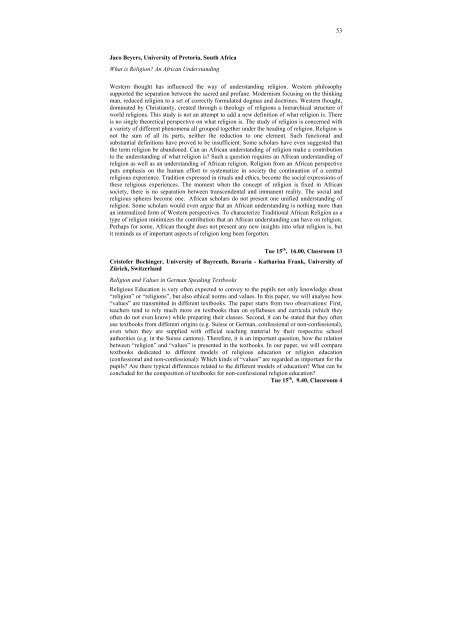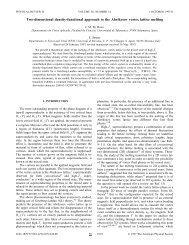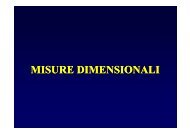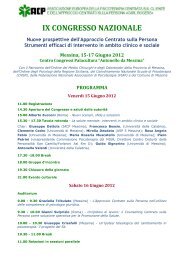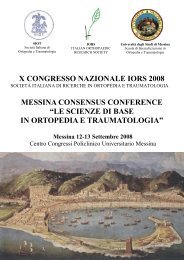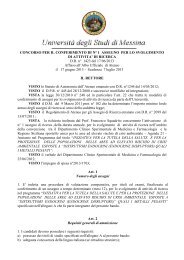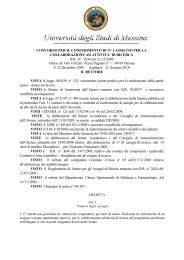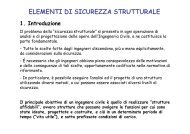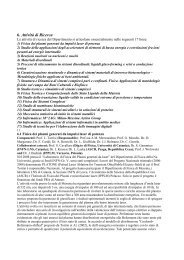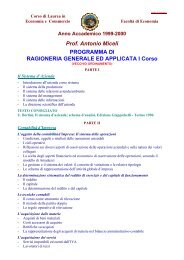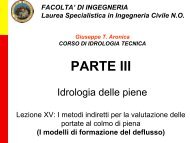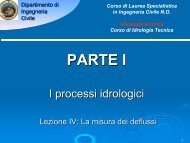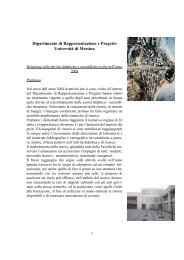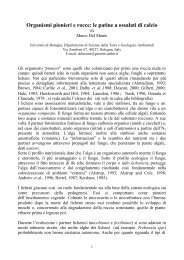PROGRAMME AND ABSTRACTS - Università degli Studi di Messina
PROGRAMME AND ABSTRACTS - Università degli Studi di Messina
PROGRAMME AND ABSTRACTS - Università degli Studi di Messina
You also want an ePaper? Increase the reach of your titles
YUMPU automatically turns print PDFs into web optimized ePapers that Google loves.
Jaco Beyers, University of Pretoria, South Africa<br />
What is Religion? An African Understan<strong>di</strong>ng<br />
Western thought has influenced the way of understan<strong>di</strong>ng religion. Western philosophy<br />
supported the separation between the sacred and profane. Modernism focusing on the thinking<br />
man, reduced religion to a set of correctly formulated dogmas and doctrines. Western thought,<br />
dominated by Christianity, created through a theology of religions a hierarchical structure of<br />
world religions. This study is not an attempt to add a new definition of what religion is. There<br />
is no single theoretical perspective on what religion is. The study of religion is concerned with<br />
a variety of <strong>di</strong>fferent phenomena all grouped together under the hea<strong>di</strong>ng of religion. Religion is<br />
not the sum of all its parts, neither the reduction to one element. Such functional and<br />
substantial definitions have proved to be insufficient. Some scholars have even suggested that<br />
the term religion be abandoned. Can an African understan<strong>di</strong>ng of religion make a contribution<br />
to the understan<strong>di</strong>ng of what religion is? Such a question requires an African understan<strong>di</strong>ng of<br />
religion as well as an understan<strong>di</strong>ng of African religion. Religion from an African perspective<br />
puts emphasis on the human effort to systematize in society the continuation of a central<br />
religious experience. Tra<strong>di</strong>tion expressed in rituals and ethics, become the social expressions of<br />
these religious experiences. The moment when the concept of religion is fixed in African<br />
society, there is no separation between transcendental and immanent reality. The social and<br />
religious spheres become one. African scholars do not present one unified understan<strong>di</strong>ng of<br />
religion. Some scholars would even argue that an African understan<strong>di</strong>ng is nothing more than<br />
an internalized form of Western perspectives. To characterize Tra<strong>di</strong>tional African Religion as a<br />
type of religion minimizes the contribution that an African understan<strong>di</strong>ng can have on religion.<br />
Perhaps for some, African thought does not present any new insights into what religion is, but<br />
it reminds us of important aspects of religion long been forgotten.<br />
53<br />
Tue 15 th , 16.00, Classroom 13<br />
Cristofer Bochinger, University of Bayreuth, Bavaria - Katharina Frank, University of<br />
Zürich, Switzerland<br />
Religion and Values in German Speaking Textbooks<br />
Religious Education is very often expected to convey to the pupils not only knowledge about<br />
“religion” or “religions”, but also ethical norms and values. In this paper, we will analyse how<br />
“values” are transmitted in <strong>di</strong>fferent textbooks. The paper starts from two observations: First,<br />
teachers tend to rely much more on textbooks than on syllabuses and curricula (which they<br />
often do not even know) while preparing their classes. Second, it can be stated that they often<br />
use textbooks from <strong>di</strong>fferent origins (e.g. Suisse or German, confessional or non-confessional),<br />
even when they are supplied with official teaching material by their respective school<br />
authorities (e.g. in the Suisse cantons). Therefore, it is an important question, how the relation<br />
between “religion” and “values” is presented in the textbooks. In our paper, we will compare<br />
textbooks de<strong>di</strong>cated to <strong>di</strong>fferent models of religious education or religion education<br />
(confessional and non-confessional): Which kinds of “values” are regarded as important for the<br />
pupils? Are there typical <strong>di</strong>fferences related to the <strong>di</strong>fferent models of education? What can be<br />
concluded for the composition of textbooks for non-confessional religion education?<br />
Tue 15 th , 9.40, Classroom 4


